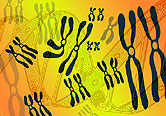Extended testing recommended for mutations in KRAS, NRAS in patients with metastatic CRC
THURSDAY, Oct. 8, 2015 (HealthDay News) — For patients with metastatic colorectal cancer, anti-epidermal growth factor receptor (EGFR) monoclonal antibody (MoAB) therapy should be considered only after extended RAS testing, according to a study published online Oct. 5 in the Journal of Clinical Oncology.
Recent phase II and III trials indicate that patients whose tumors harbor RAS mutations in exons 2, 3, and 4 are unlikely to benefit from MoAB therapy directed against EGFR. With this in mind, Carmen J. Allegra, M.D., from the University of Florida in Gainesville, and colleagues updated the Provisional Clinical Opinion (PCO) addressing the utility of extended RAS gene mutation testing in patients with metastatic colorectal cancer.
The researchers obtained data from 11 systematic reviews with meta-analyses, two retrospective analyses, and two health technology assessments based on a systematic review, in addition to the evidence reviewed in the original PCO. They assessed outcomes for patients with versus without mutations in additional exons. The updated PCO states that patients with metastatic colorectal cancer who are candidates for anti-EGFR antibody therapy should have their tumors tested for both KRAS and NRAS exons 2, 3, and 4.
“The weight of current evidence indicates that anti-EGFR MoAb therapy should only be considered for treatment of patients whose tumor is determined to not have mutations detected after such extended RAS testing,” the authors write.
One author disclosed ties to the biopharmaceutical industry.
Copyright © 2015 HealthDay. All rights reserved.








